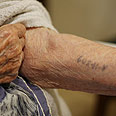
Golda Zandman. Spent five years in Sweden
Photo: Avishag Shear-Yeshuv

Memory that will never be erased
Photo: Avishag Shear-Yeshuv
Several Holocaust survivors were stunned last weekend by remarks made by Foreign Minister Avigdor Lieberman,
who slammed
the Swedish government last week over its refusal to condemn a newspaper which accused
the Israel Defense Forces of harvesting Palestinians' organs.
Golda Zandman, an 89-year-old Holocaust survivor, who arrived in Israel
largely thanks to the Swedish government, was amazed by this statement. "It's simply not true – the Swedes are not anti-Semites," she told Ynet on Sunday. "There is no such thing in Sweden. But what would Lieberman know about it? He emigrated from Russia."
"It's a shame that the Swedish Foreign Ministry fails to intervene in a case of blood libels against Jews. This is reminiscent of Sweden's stand during World War II, when had failed to intervene as well," Lieberman had said.
Much Ado About Nothing?
Stockholm Jewish community leader Lena Posner tells Ynet article accusing IDF soldiers of harvesting Palestinians' organs was buried in back pages of Swedish tabloid, before angry Israeli response inflamed situation. 'Anti-Semitism here is not so bad, and bringing up the Holocaust every time is definitely unhelpful to us'

Zandman was born in Strachwitz, Poland. She was 18 years old when the World War II broke out. After the German occupation she was sent to a labor camp in the city, and was later sent to the Auschwitz concentration camp and then to Bergen Belsen.
When the war ended she was sent to Sweden, immigrated to Israel on an illegal immigrant ship, was deported to Cyprus, and returned during the War of Independence. After a few difficult years in Israel she started her own family.
She told Ynet about her life in the Scandinavian country: "I lived in Sweden for five years after the war and rehabilitated my life. It was beautiful there like in a convalescent home. If the Swedes hadn't helped me after the war, I don’t know what would have happened. I may not have been here."
Zandman, who was about 20 years old at the time, was sent to Sweden with her 13-year-old sister and other Jewish refugees at the end of World War II.
"They treated us very well. The Swedes saved me, gave us food, medications and clothes. After recovering, I worked in cleaning and in a hospital. I got a nice salary and even managed to buy nice things for myself and my sister. Until I immigrated to Israel in 1947," she recalled.
"Everything was free and beautiful there. I didn’t feel any anti-Semitism. I had good Swedish friends who gave me gifts to help. The Nazis were terrible, and compared to them the Swedes were like bread and honey. That's why I can't tolerate what Lieberman said. It's simply a lie."
'Luxurious summertime convalescent home'
In her book, "Sipure Goldah" (Golda's stories), Zandman wrote about the trip to Sweden after the war. "We were driven on a truck to a luxurious train. Each of us was given a bed to lie on. We traveled on the train like this for three days, during which we were treated very well.
"We arrived in Sweden through the city of Lübeck. From there we were taken to a luxurious summertime convalescent home, which was closed. They gave us nice beds, which were covered with paper sheets, and provided all out urgent needs.
"We had a very good time there. We didn't miss a thing. We got beautiful clothes. A nightgown, two summer dresses, two winter dresses, a coat, shoes and boots. There was no shortage of food as well. The food was very good, like in a convalescent home."
Dr. Robert Rozett, a historian and director of the libraries at the Yad Vashem Holocaust Museum, agrees with Zandman. "The foreign minister's statement is not accurate from a historical point of view," he says.
"It's true that Sweden's record from the World War II period is not bright and clean, but no country emerged well from that period. The United States is not historically clean as well. Sweden's record – like that of most countries at the time – is mixed."

According to Dr. Rozett, while in the 1930s the Swedes had implemented a pro-Germany policy, in the 1940s they had already saved thousands of Jews from extermination.
"Sweden in the 1930s was like most European countries, because it took in Jewish refugees but not generously. Some 2,000 Jews in total. Even when the war broke out, it was 'neutral pro-Nazi' and let the Germans use trains to transfer soldiers to Scandinavia."
This trend changed at the end of 1942, he says, when the Nazis began deporting Norway's Jews. "The Swedes opened their gates to 900 of Norway's Jews as a gesture of Scandinavian nations. In 1943, after the great battle of Stalingrad, which marked the German's greatest defeat during the war, the Swedes supported the allies and took in 7,200 out of Denmark's 8,000 Jews who were slated to be sent to the camps."
Dr. Rozett also mentions Raoul Wallenberg. "We remember the story of the diplomat who was sent on behalf of Sweden and worked to save Jews at the embassy in Budapest. Eventually, during the last days of the war, the Swedes took action and released women from the Ravensbrück camp."















